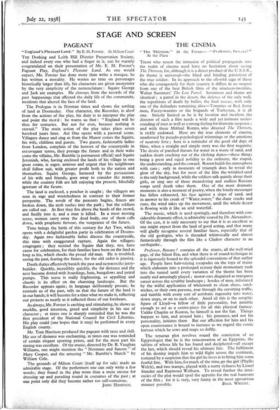THE CINEMA
THOSE who resent the intrusion of political propaganda into the realm of cinema need have no hesitation about seeing The Thirteen, for, although it is a direct product of the U.S.S.R., its theme is universal—the blind and binding patriotism of the true soldier. In its approach to the oft-told saga of those who die courageously for their country it differs in no respect from one of the best British films of the nineteen-twenties, Walter Summers' The Lost Patrol. Sentiment and theme are identical ; a patrol in the desert, the defence of the only well, the repetitions of death by bullet, the final rescue, with only one of the defenders remaining alive—Tommies or Red Army men, Fuzzy-wuzzies or the brigands of Turkestan, it is all one. Strictly limited as he is by location and incident, the director of such a film needs a wide and yet intimate under- standing of men as well as a strong feeling for dramatic suspense ; and with these Mikhail Romm, who directed The Thirteen, is richly endowed. Here are the true elements of cinema, unadorned by pseudo-psychological trimmings or the emotions of neurotic love ; here is a reminder of the good old days of films, when a straight and simple story was the first requisite. The desire of parched throats for water in a waste of sand, and sudden death cracking out of the choking dunes—these things bring a great and equal nobility to the ordinary, the stupid, the understanding, and the coward. Romm builds his atmosphere with care ; only in moments of triumph does he reveal the glow of the sky, but for most of the film the wrinkled sand is the only background, while the soldiers talk quietly about their girls, or sing one of those meandering and endless Russian songs until death takes them. One of the most dramatic moments is also a moment of poetry, when the lonely messenger has fallen exhausted, his face against a slope of sand, and in answer to his croak of " Water, water," the dune cracks and runs, the wind takes up the movement, until the whole desert is flowing with it like an arid waterfall.
The music, which is used sparingly, and therefore with con- siderable dramatic effect, is admirably scored by Dr. Alexandrov. Of the cast, it is only necessary to say that it is as excellent as one might expect from the land of good acting, and that many will gladly recognise several familiar faces, especially that of the old geologist, who is threaded whimsically and almost fantastically through the film like a Chekov character in an earthquake..
Professor, Beware ! contains all the stunts, all the well-tried gags, of the Silent Era, and what there is of sound-technique in it is rigorously bound to the splendid conventions of that earlier age. People have hair-raising escapades on the tops of trains which elaborate into a prolonged ecstasy their momentary rush into the tunnel until every variation of the theme has been neatly and amusingly played ; motor-cars disguised as marquees career across the scrubby landscape ; hordes of men, infuriated by the wilful application of whitewash to clean shoes, sand- wiches, or their own persons, roar through the cavorting traffic, and tumble with every sort of acrobatic ingenuity into water, down steps, or on to each other. Amid all this is the seraphic figure of Lloyd—a fellow of little personality, but amiable enough to act as a centre-piece for all this physical fantasy. Unlike Chaplin or Keaton, he himself is not the fun. Things happen to him, and around him ; his presence, and not his personality, initiates them. But our affection for him and his open countenance is bound to increase as we regard the comic harvest which he sows and reaps so deftly.
The tenuous plot revolves round the conviction of an Egyptologist that he is the reincarnation of an Egyptian, the tablets of whose life he has found and deciphered-7all except the last, which should reveal his ultimate fate. The fulfilment of his destiny impels him to wild flight across the continent, tortured by a suspicion that the girl he loves is to bring him some fearful fate. With him, for much of the time, go the girl (Phyllis Welch), and two tramps, played with a nutty richness by Lionel Stander and Raymond Walburn. To reveal further the intri- cacies of the plot would spoil the appetite for the real humours of the film ; for it is very, very funny in the most uproarious











































 Previous page
Previous page